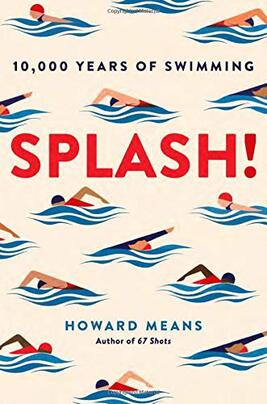A 2020 Book Chronicles the Growth of Swimming
A Quick Book Review
Swimming, like running, often seems so rudimentary an activity that one might take for granted the idea that it has always been a means of exercise or at least fun.

Turns out, the practice of swimming or splashing around in the ocean or a lake wasn't always seen with favor. Although there are records of swimming from ancient Egypt, the bible, and the history of the Greek and Roman empires, the idea fell out of favor in Europe as the Middle Ages took hold. Sanitation fears and a puritanical streak inhibited would-be swimmers from exploring water - being able to swim, or stay afloat, was proof of witchcraft, after all.
Edward Digby's The Art of Swimming in 1587 helped mark a turning point, though, by emphasizing the very practical use of swimming as life-saving in an era heavy with sailing. And off Means leads us into the renaissance of swimming over the next hundreds of years - as exercise, as fashion, as leisure, as socio-political indicator.
Growing pains still exist. The struggle to integrate swimming in the U.S. as part of the civil rights movement and the ramifications of Black Americans' historical inability to access a pool is covered seriously and importantly.
It does take Splash! until chapter 14 to really dive into Olympic swimming. As one of the original modern Olympics' sports from 1896, swimming has been a mainstay on the Games' program. But Means underlines the evolution the definition of swimming has gone through - gone are underwater dives and obstacle courses, and refinement brought swimming pools (!), the backstroke in 1904 , women's competition in 1912, and the butterfly in relatively-recent 1956. And, still today, tweaking of what constitutes an appropriate turn, or stroke, or kick, or swimsuit, or depth of the pool's water continues.
For this die-hard Olympics fan, there could always be more comment of swimming from a Games' angle, but Means does revisit heroes such as Gertude Eberle, Johnny Weissmuller, and Duke Kahanamoku, who all played a part in pushing the sport's popularity. Memories of iconic Olympic moments - Jason Lezak's Beijing 2008 anchor leg, Jon Sieben's upset comeback win at Los Angles 1984, Team USA's lone women's gold medal at Montreal 1976 - are remembered. Michael Phelps, as the embodiment of an ideal 'swimmer's body', is featured, as is Donna de Varona, the would-be multi-Games star had swimming in the '60s been as lucrative as it is today.
One fascinating anecdote presented is the 1973 cultural/sport visit by U.S. swimmers in China, seen as a provocation by some, including the I.O.C. Had there not been contention on earlier attempts, swimming - and not ping pong - may have been the lead-in for a diplomatic breakthrough with the People's Republic.
p.s. Did you relaize that water polo was one of the first official team sport in the Olympics, at Paris 1900? Of those at those Games (cricket, basque pelota, rugby union), it's the only one still around.
Splash! is a fun, engaging, and at times sobering, read that gives good perspective of the sport's origins and growth. It being a work of passion by Means is evident, and the invitation to join him in the celebration of swimming is clear. Count me in.


 RSS Feed
RSS Feed